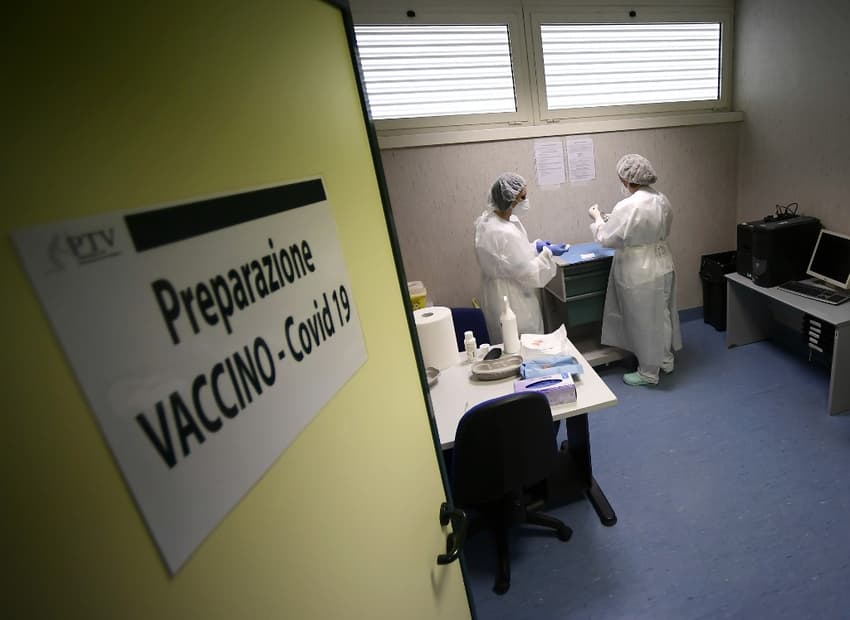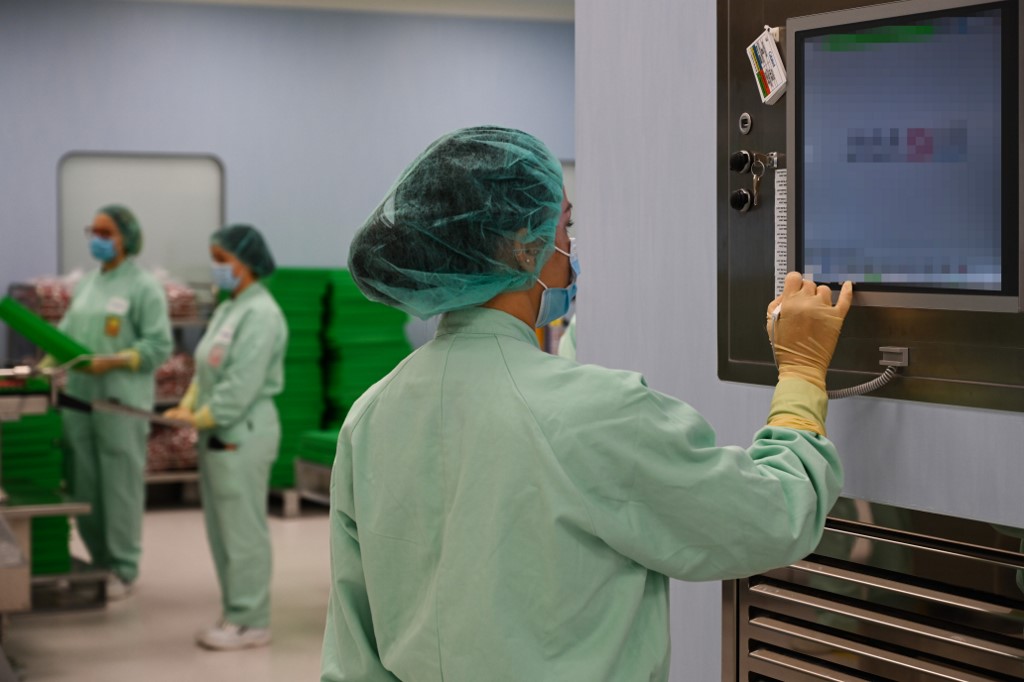Covid-19: Italian regions pause new vaccinations after Pfizer supply delay

Italy is pushing ahead with second vaccinations, but most regions are pausing first doses following news that deliveries of Pfizer’s vaccines will be delayed.
Italy is pushing ahead with second vaccinations, though many regions will suspend first doses following news that deliveries of Pfizer’s vaccines will be delayed.
Italy has begun administering second doses of the Pfizer vaccine to health workers and elderly care home residents who received the first dose three weeks ago on ‘V-Day’, December 27th, the start of the European vaccine roll-out.
READ ALSO: Italy has vaccinated more than one million people against Covid-19
However, just as Italy began distributing the second doses, the vaccination campaign in Italy and elsewhere in Europe was hit by a temporary reduction in supplies of the vaccine by Pfizer.
Pfizer announced on Friday that it would supply fewer doses of the vaccine than originally expected this week due to work to upgrade its factory in Puurs, Belgium.
The company has since confirmed it will resume expected delivery volume from January 25th.
Due to the delay, Italy is set to get around 165,000 fewer doses than expected.
Which regions are affected?
As a result of the delay, all Italian regions have had their vaccination allocations cut except for the following six: Abruzzo, Basilicata, Marche, Molise, Umbria and Valle d'Aosta, according to Rai.
Many regions including Tuscany and Veneto have announced that they’ll only be administering the booster doses, while pausing new vaccinations.
Regional health authorities had reportedly been told to set aside 30 percent of the doses to ensure second doses could be administered smoothly, but not all have done so.
Campania for example has already administered 97 percent of available doses, and other regions such as Veneto, Emilia Romagna, Umbria and Tuscany have given over 80 percent.

Photo: AFP
The European Commission has purchased some two billion vaccine doses from multiple companies for use in the 27 member states.
The contract with Pfizer/BioNTech is for 600 million doses, half of which were set to be delivered before September.
While EU member states started vaccinating people on December 27th in a coordinated roll-out, each country is responsible for its own vaccination strategy.
In Italy, the vaccination programme also varies by region.
Italy has so far administered 1.1 million of its 1.4 million doses - the most in Europe in numerical terms.
COMPARE: How fast are European countries vaccinating against Covid-19?
As of January 18th, a total of 1,153,501 vaccinations have been administered in Italy - or nearly 82 percent of the doses delivered so far.
Italy's latest vaccination data, both regional and national, is being regularly updated on this website.
The vaccine is not yet available to the general population in Italy.
Some regions including Lazio have said they aim to begin vaccinating over-80s in February.
Doctors and other health care workers are first in line (some 1.4 million people) along with residents in care homes - just over 570,000 people. the health ministry has said.
Those aged over 80 will be next in line, followed by those aged 60-79, and those suffering from at least one chronic disease.
Vaccines will then be distributed to key workers - teachers, police, prison wardens
After that, it will be offered to the general population at walk-in centres and specially-designed kiosks.
While the government plans to have up to 1,500 vaccination kiosks built in time for the roll-out of the vaccine to the general population, data shows there are currently 293 distribution points across Italy.
The vaccine will be free, and will not be obligatory.
Italy's government said it was confident most of the population could be vaccinated by September, Reuters reports.
Scientists estimate that 60-90 percent of a population needs to be vaccinated – possibly every year – to reach herd immunity against the coronavirus and stop future outbreaks.
Comments
See Also
Italy is pushing ahead with second vaccinations, though many regions will suspend first doses following news that deliveries of Pfizer’s vaccines will be delayed.
Italy has begun administering second doses of the Pfizer vaccine to health workers and elderly care home residents who received the first dose three weeks ago on ‘V-Day’, December 27th, the start of the European vaccine roll-out.
READ ALSO: Italy has vaccinated more than one million people against Covid-19
However, just as Italy began distributing the second doses, the vaccination campaign in Italy and elsewhere in Europe was hit by a temporary reduction in supplies of the vaccine by Pfizer.
Pfizer announced on Friday that it would supply fewer doses of the vaccine than originally expected this week due to work to upgrade its factory in Puurs, Belgium.
The company has since confirmed it will resume expected delivery volume from January 25th.
Due to the delay, Italy is set to get around 165,000 fewer doses than expected.
Which regions are affected?
As a result of the delay, all Italian regions have had their vaccination allocations cut except for the following six: Abruzzo, Basilicata, Marche, Molise, Umbria and Valle d'Aosta, according to Rai.
Many regions including Tuscany and Veneto have announced that they’ll only be administering the booster doses, while pausing new vaccinations.
Regional health authorities had reportedly been told to set aside 30 percent of the doses to ensure second doses could be administered smoothly, but not all have done so.
Campania for example has already administered 97 percent of available doses, and other regions such as Veneto, Emilia Romagna, Umbria and Tuscany have given over 80 percent.

Photo: AFP
The European Commission has purchased some two billion vaccine doses from multiple companies for use in the 27 member states.
The contract with Pfizer/BioNTech is for 600 million doses, half of which were set to be delivered before September.
While EU member states started vaccinating people on December 27th in a coordinated roll-out, each country is responsible for its own vaccination strategy.
In Italy, the vaccination programme also varies by region.
Italy has so far administered 1.1 million of its 1.4 million doses - the most in Europe in numerical terms.
COMPARE: How fast are European countries vaccinating against Covid-19?
The vaccine is not yet available to the general population in Italy.
Some regions including Lazio have said they aim to begin vaccinating over-80s in February.
Doctors and other health care workers are first in line (some 1.4 million people) along with residents in care homes - just over 570,000 people. the health ministry has said.
Those aged over 80 will be next in line, followed by those aged 60-79, and those suffering from at least one chronic disease.
Vaccines will then be distributed to key workers - teachers, police, prison wardens
After that, it will be offered to the general population at walk-in centres and specially-designed kiosks.
While the government plans to have up to 1,500 vaccination kiosks built in time for the roll-out of the vaccine to the general population, data shows there are currently 293 distribution points across Italy.
The vaccine will be free, and will not be obligatory.
Scientists estimate that 60-90 percent of a population needs to be vaccinated – possibly every year – to reach herd immunity against the coronavirus and stop future outbreaks.
Join the conversation in our comments section below. Share your own views and experience and if you have a question or suggestion for our journalists then email us at [email protected].
Please keep comments civil, constructive and on topic – and make sure to read our terms of use before getting involved.
Please log in here to leave a comment.